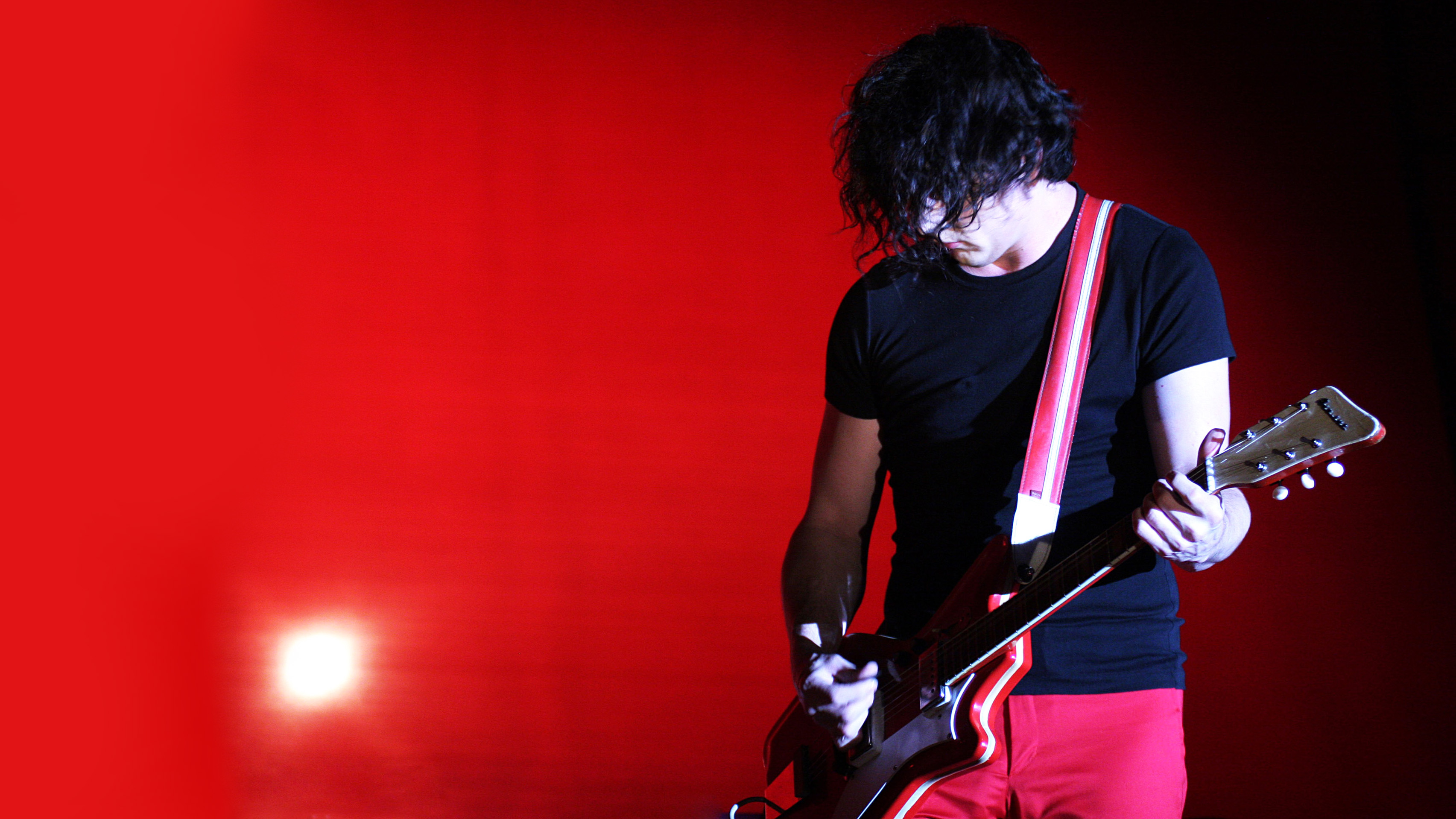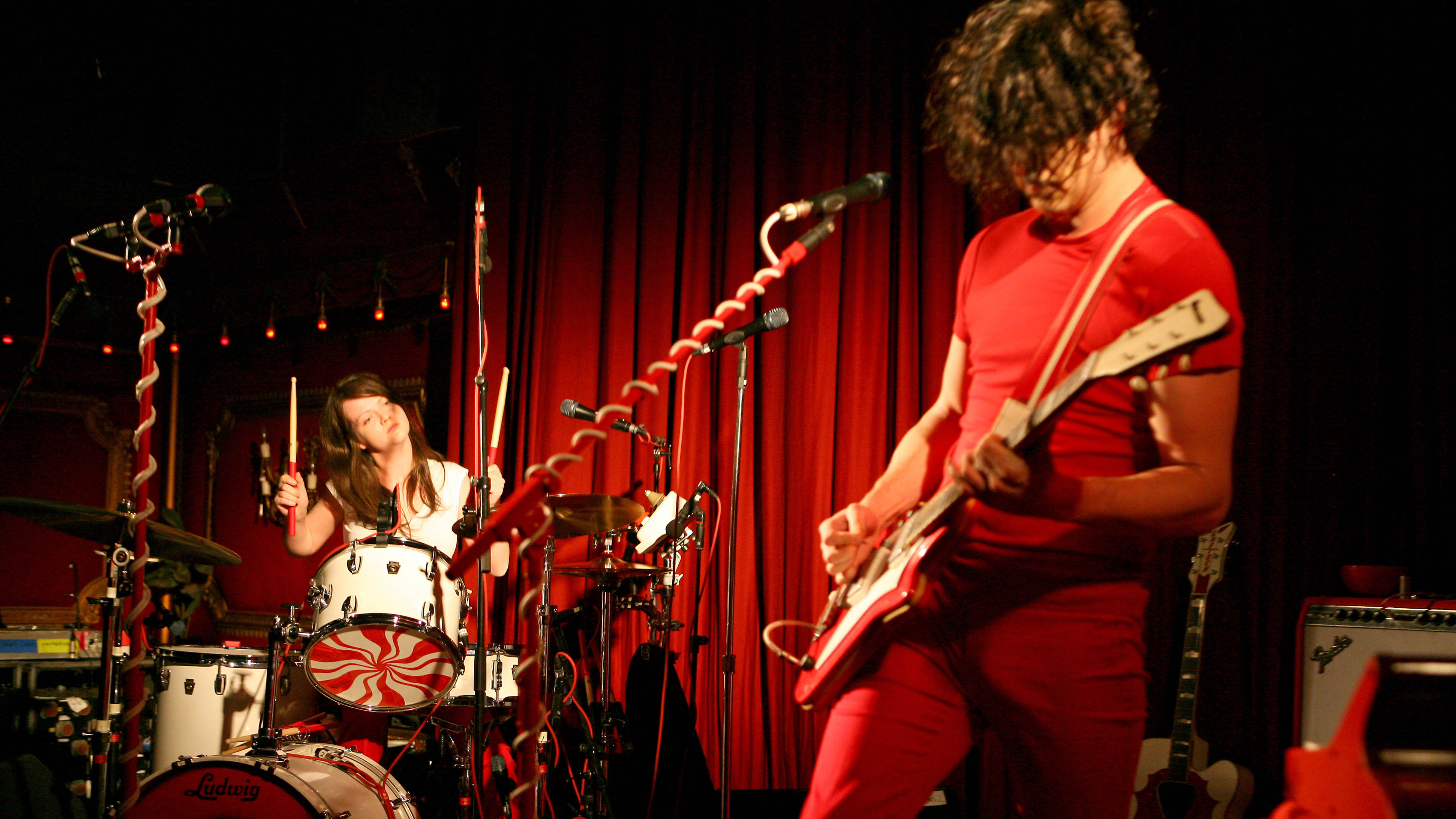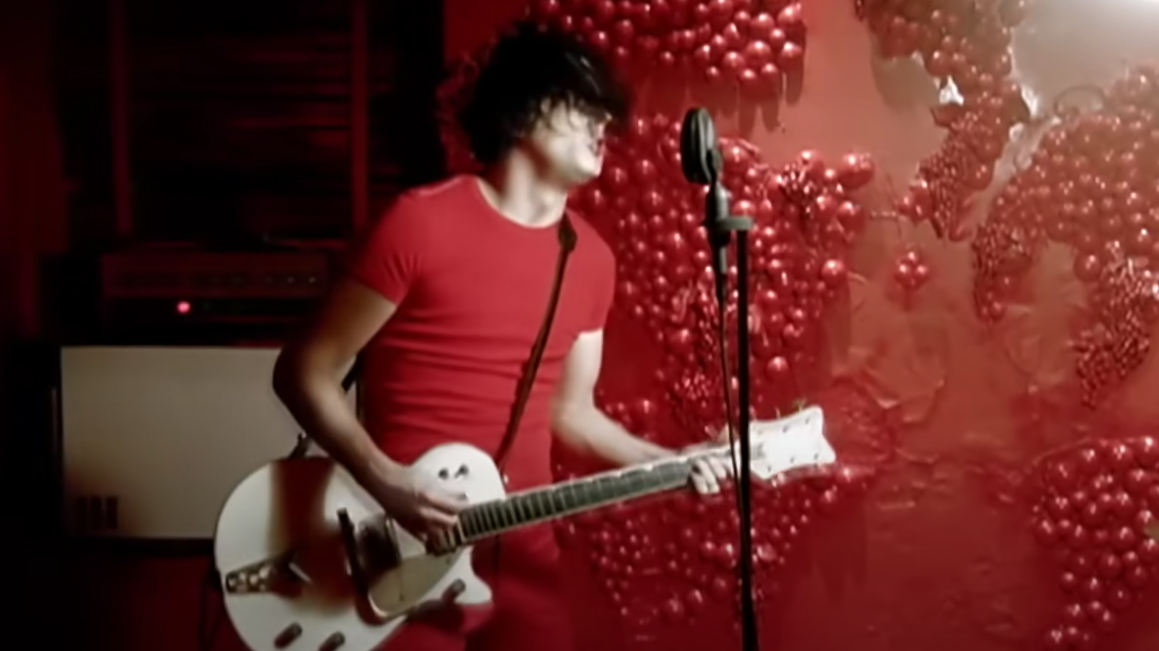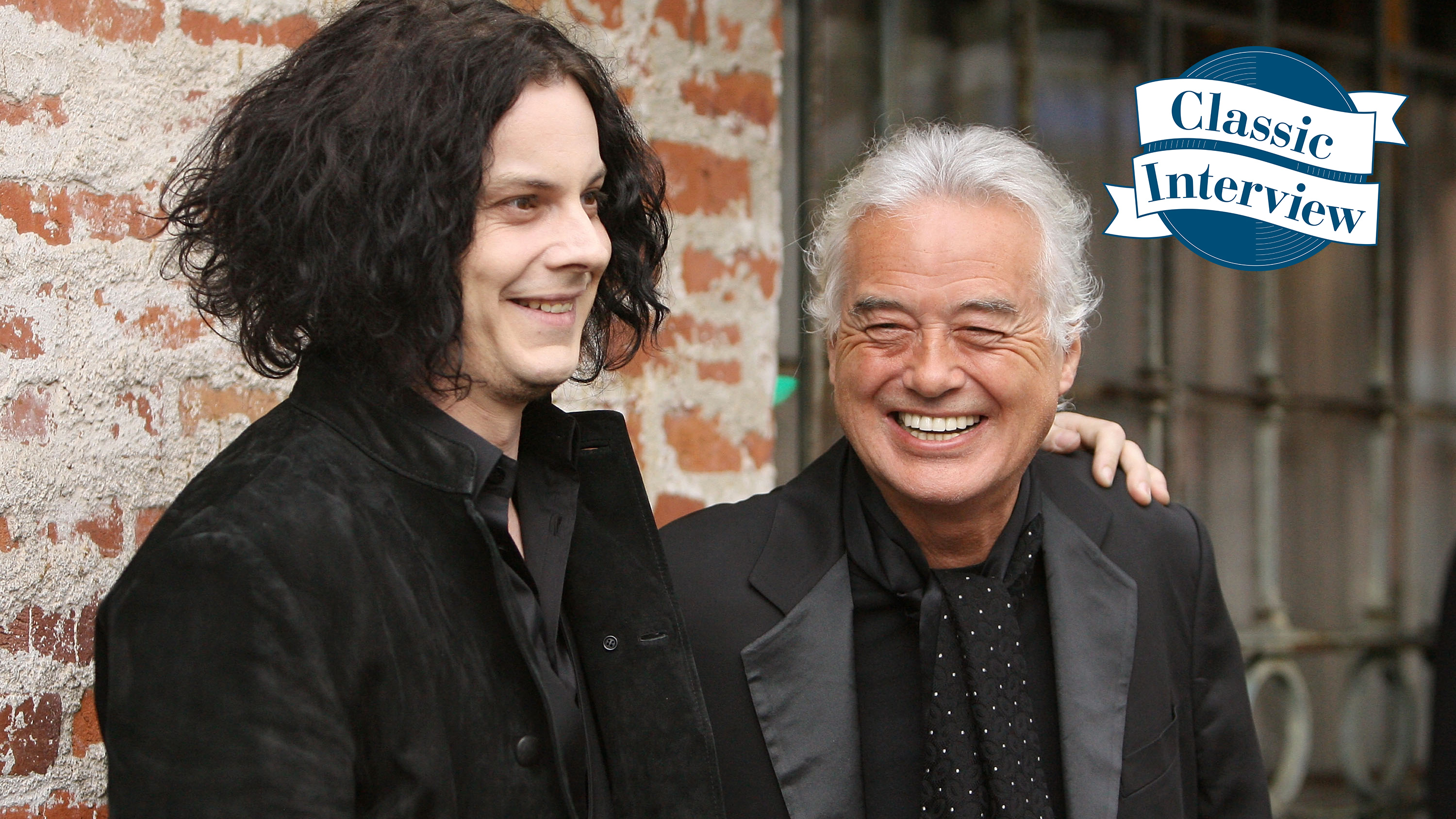
”Have fun? I don’t really have ‘fun’ doing music, and I don’t even know if I ever want to have ‘fun’ doing music…”
When Jack White finished recording the new White Stripes album, Icky Thump, he was certain of two things: he wanted out of the “hipster cool” garage scene for good, and regardless of whether he had ‘fun’ recording Icky Thump, playing guitar onstage night after night with The Raconteurs bandmate Brendan Benson relighted his passion for playing and recording guitars.
In this interview with Total Guitar from 2007, White talks through the new album, how he dealt with heavyweight concepts such as death and respect, his super-rare Gretsch White Penguin, and how he’s now living the simple life in Nashville...
It’s always about the moment
Get Behind Me Satan was notable for its lack of guitars; Icky Thump marks your return to the guitar fold. What brought you back?
“People seem to think I premeditate the sound of our records, but I don’t. It’s always about the moment. With Satan I had a piano in the living room and I was writing a lot on that, so a lot of piano ended up on the record. With Icky I was coming off a year of touring with The Raconteurs, playing guitar every night onstage and doing guitar improvisations with Brendan.
“It was the first time I’d played onstage with another guitarist in years, so that’s why there’s a lot of guitar on this album. It also has Hammond organ on it, which I used because it was in my living room. I use whatever’s lying around.”
This is also the first White Stripes album you’ve done in a modern recording studio…
“Yeah, I guess we’ve just worked out the kinks. With The White Stripes, we were always scared of big studios and how we’d end up sounding too polished or having to fight through modernity to sound real. But we’ve done a few albums now and I think we have enough experience behind us to know what we want, as far as other people are concerned.
“That was always the initial worry: you get a lot of people involved on a project and you’ve gotta fight your idea through everyone. Every album we’ve done in the past was just Meg, me and a studio engineer, so there was less chance of things getting messed up. I don’t like having to be polite when I have an idea.
“I’m a very polite person when it comes to other people’s ideas. If someone says, 'Let’s record the snare drum like this,' I’ll be like, 'Well, actually…' I’m trying to be polite. I don’t want to be egotistical and say, 'No, do as I say!' So I have the least amount of people possible around so that I don’t have to do that.”
That particular song seems to deal with the concept of death too?
“In a lot of these songs the characters are at a turning point in their lives. You know, one of those moments when they’re taking a deep breath and saying, ‘Hey, I don’t have much time on this earth. Maybe I should think about some of this stuff.’
It’s hard to get a perspective on this when you’re surrounded by people in the music business and when you’re on tour all the time. Rock ’n’ roll is not really known for its great examples of human decency
“There are all these fundamental questions: why do you bother getting up in the morning? How much should you care about other people? How considerate should you be? How much should you just look out for your own self? These characters are trying to find some kind of purpose for what they do on a daily basis and realising that, since they’re not going to be here for long, it’s time to buck up.
“It’s hard to get a perspective on this when you’re surrounded by people in the music business and when you’re on tour all the time. Rock ’n’ roll is not really known for its great examples of human decency.”
There’s also a political dimension to this album, with the title track addressing the illegal immigration issue in the States…
“There’s this quote from Bob Dylan where he pointed out that you can be heavily involved or interested in a topic without necessarily being political. Icky Thump is a song about a set of characters and the question of who is using who in a particular situation.
“The first thing that kept popping up in my head was people who go to a strip club or go to see a prostitute, and that’s always a question of who’s using who. Then it became this guy who goes over the border to see a prostitute because he’s afraid to do it in front of people he knows. And then it became the Mexican border, which brings in the whole issue of Americans using Mexicans to clean their houses and wash their clothes yet wanting to kick them out of the country at the same time.
“That duality started coming up. And the hypocrisy, on top of that, of trying to distract people from the war [in Iraq] by trying to get them to build a wall between Mexico and America. How ridiculous can it get?”
Staying within the realm of songwriting, how do you formulate lyrics?
“I don’t premeditate a lot. I let things be what they want to be within the constricted parameters of The White Stripes. A great example would be that every White Stripes album has a song that starts with the word ‘little’. We didn’t even realise that until about the fourth or fifth album. It just never occurred to us.
“But now we have to do it because we worry if we don’t; there’s something superstitious about it. Meg was worried that there wasn’t going to be a ‘little’ song on this album, but I said, ‘It’s OK. We can call this song here Little Cream Soda ’cos I say the words ‘little cream soda’ in the lyrics.’
Except for the first White Stripes album, our songs have mostly been half-written in the studio
“I don’t overwrite very often either. Usually when I get two verses, I’m almost scared to come up with the third. I feel like it’s too soon. I want to let it breathe for a while. So, except for the first White Stripes album, our songs have mostly been half-written in the studio.”

When you’re writing, do you instantly know whether a song is going to be a White Stripes song or a Raconteurs song?
“I’ve always been a follower of the idea of letting the song tell you what it wants to be and what instruments it wants to have on it, where it wants to go and where it wants to live. There is no actual point where you become the creator. You’re not in control. You only manoeuvre the song. You only do what it tells you to do.
“It’s like, a song starts and it will tell you, ‘I want strings on this,’ or ‘I want heavy guitars on this.’ Take You Don’t Know What Love Is: if I was in control it would have come out sounding more country, but it didn’t want to be a country song. You can hear a country-ness in it, certainly, but it ended up being what it wanted to be.”
Blind Willie Johnson is my favourite slide player. His recordings have this otherworldliness, and the fact that they even recorded his music is kind of surprising to me
So who would you say are your favourite songwriters of all time?
“Cole Porter’s definitely one. Then there’s Irving Berlin, Charlie Patton, Hank Williams, Bob Dylan, Robert Johnson, Howlin’ Wolf… although it’s hard to say with some of the blues guys because you don’t know what they actually wrote and what they didn’t. [With guitar players] Blind Willie Johnson is my favourite slide player.
“His recordings have this otherworldliness, and the fact that they even recorded his music is kind of surprising to me. It’s just a beautiful haunting slide guitar. You wonder why he would even play it like that. He can’t really be topped on my list.”
Tell us about the guitars and effects that you used on Icky Thump…
“I used the same guitars I’ve played on every White Stripes album: my red Airline guitar and my Kay hollowbody that I use for slide in open A or E. Everything else is in standard. I also used a couple of Telecasters on this album: my ’69 Telecaster and a ’54, I believe, that they have here in the studio.
I wish I could get DigiTech or Electro-Harmonix or somebody to make me a Whammy that only goes one octave up or down. No fifths or thirds or anything. Just octaves. But no-one can seem to return my call...
“It’s a little bit lighter in weight than my ’69, which has a Bigsby on it. So I would take the ’54 Tele down off the wall and do some really quick things with it. I could do high-pitched stuff and make the distortion what I wanted it to be, instead of the high output that comes from my other guitars; they’re kind of scratchy.
“I might use the Teles if I needed to do something with the [Electro-Harmonix] POG [Polyphonic Octave Generator] pedal, double and triple octaves. I think I was the first person to use the POG pedal when I used it on Blue Orchid from Satan. I don’t like the effects on that, but I do like the octaves.
“I also use a [DigiTech] Whammy or the POG for the octaves, too. And Electro-Harmonix has a new one out now called the HOG [Harmonic Octave Generator], which lets you go down four octaves. I think I used it on one song, but I don’t know if I can bring myself to take that one on the road with me. It’s probably more for jazz fusion or something like that. I wish I could get DigiTech or Electro-Harmonix or somebody to make me a Whammy that only goes one octave up or down. No fifths or thirds or anything. Just octaves. But no-one can seem to return my call...” [Jack got there in the end with the CopperSound collaboration Third Man Triplegraph pedal, as you'll see in the video below].
Are you still using your Silvertone amp?
“Yeah, I use a 100-watt Silvertone with a 100-watt Blackface Fender Twin Reverb, and this time I also had a Silverface Twin. I didn’t get my 100-watt Silvertone until a couple of albums in. I had a 50-watt Silvertone for the first two White Stripes albums, and it took me five years to find my first 100-watt one. Then I found the second one I have only a few months later, so now I have three of them! I use two in The White Stripes and one in The Raconteurs.”
If someone says to me, ‘good show’ or ‘good album’ I know I can be proud of it because of the conditions it was made under
Your distortion tone is really ‘sustainy’. Is that a function of the light-bodied plastic guitars you use?
“Yeah, the guitars are so old they don’t have much sustain and I love that. I like to let the reverb from the amp take over. The note starts to die but you get almost a little grace note from the reverb that carries it over. In some ways, it makes me work harder. Like, ‘OK, that note’s gone Jack. It’s time to come up with a new one. Keep going.’
“There are no safety nets in The White Stripes. It’s obviously harder for me to work with a 1964 plastic guitar compared with a brand new one right off the factory line, all perfectly intonated, but if someone says to me, ‘good show’ or ‘good album’ I know I can be proud of it because of the conditions it was made under.”
I love that guitar a lot. It’s probably my favourite guitar
There’s also some straight-up acoustic on the new album…
“I played a Gibson L1, which is the Robert Johnson model. I have one from 1915 and there are clips of me using that one all over the place on the last White Stripes tour. We just put a surface-mounted pickup on it – one that you tape on, like they use on a violin. It was hard to pull off live, but we do have songs where Meg wouldn’t play so loud and it would be OK. I love that guitar a lot. It’s probably my favourite guitar. It has a nice V-shaped neck and a wonderful tone.”

So, tell us about the immensely rare Gretsch White Penguin you’ve just bought!
“Yeah, I just got it. I didn’t use it on this new White Stripes record, but that guitar sounds incredible and I did use it on another song, which I basically co-wrote with Hank Williams! Bob Dylan is putting this project together where he’s asking people to finish these unfinished Hank Williams songs.
“They’re just lyric pages and Bob asked me to pick one. I did and I recorded it here at Blackbird [Studio in Nashville] as well. I used the White Penguin on that recording, and I’ll be using it live as well. I love that guitar, man. I’ve always wanted one. It’s kind of the Maltese Falcon of guitars.”
Do you see the guitar as a piece of wood with a few strings, a tool to be creative with, or is there something special going on?
“I’m drawn to the idea that it is a tool that can be manipulated and treated with either respect or disgrace. When I was young I saw a clip of Louis Armstrong on TV playing a trumpet solo. It was such a ferocious and speedy trumpet solo, and when the song ended with a bang he just slung the trumpet to one side.
You can borrow my red Airline guitar that I made famous in The White Stripes. You could borrow it for a month and I wouldn’t even ask you for it back
“He didn’t throw it on the ground, but it looked like cracking a whip. He had this attitude like, ‘It doesn’t matter what I use. I don’t need this instrument. I just use it to express a certain feeling. I could express the same energy with a bottle of water.’
“I really related to that. I jumped out of my seat when I saw that; that’s how I feel about my instruments. At the end of a song I can throw my guitars on the ground, but they know how I feel about them. I don’t care when people pick up my guitars and play them.
“You can borrow my red Airline guitar that I made famous in The White Stripes. You could borrow it for a month and I wouldn’t even ask you for it back. It’s that kind of notion. You have to find some kind of balance with your instruments…”
There’s some cool mandolin playing on Prickly Thorn, But Sweetly Worn. How long have you been playing for?
“I started playing mandolin right before I did the film Cold Mountain. I wanted to buy the one I used in the film. I signed something saying I’d buy it, but then they went and auctioned it off, so I went and bought a really nice Gibson F4. I love the mandolin, it’s a different world from guitar, and I love bluegrass music.”
You’ve got a definite passion for the blues, but would you say that country music is just as essential to your aesthetic?
“Yes, of course. On this album, Effect And Cause and You Don’t Know What Love Is both have that real country feel to them. Country music means a lot to me, so I don’t ever want it to be perceived as a gimmick in my music. It would be such a bummer to have that slapped onto your creation.”
Nashville is often dubbed ‘Music City, USA’, although ‘Country Music City, USA’ seems more appropriate. Do you feel comfortable in the surroundings of country?
“Absolutely! It’s the perfect antidote against all that cool hipster garage rock stuff. I couldn’t take anymore of that – I just had to get away from it. The music business in Nashville is the polar opposite of all that. They have this direct attitude: ‘We just want to sell a lot of records and make a lot of money.’

“I feel more comfortable with people who aren’t going to judge me in any way about being cool, being punk, being underground or independent. All those horrible words that I used to think meant something until I realised they’re nothing but empty words.
“It was a complete blessing to arrive in Nashville and leave all that stuff behind. All those people around you, all the cynics, hipsters, bloggers, internet critics, independent punk rock kids and all that crap. They aren’t going to be there next year. They aren’t loving music for what it is. They’re only loving music for the identity it gives them.”
Will you settle in Nashville or do you think you’ll eventually miss the bustle of city life?
“Nashville just feels right. I like the positive atmosphere. There’s a common horse sense to everything that appeals to my brain. I like going to the hardware store and buying a two-by-four and having it make sense, or starting the day on a bacon and eggs level. I don’t want any attitude or pretension or anything. And if there’s an attitude, it should be positive, which is what you get here in Nashville.
We’ve had a complete rollover of fans on just about every album we’ve done and it starts to get on your nerves.
“I’ve come from a strange realm – Detroit, garage rock ’n’ roll. In contrast, country fans are loyal to the death. That was never the case in garage rock. You could like a band this week, but you may not like them next week. And The White Stripes have gone through the mill on that.
“We’ve had a complete rollover of fans on just about every album we’ve done and it starts to get on your nerves. You do all this work building up a relationship with an audience and then these people just walk away, and it’s for shallow reasons too.
“They can’t like you anymore because the person who lives next door to them likes you, so now they have to like someone more obscure to keep their identity going. That shit just gets old. I thought it was supposed to be about the music, and I was fooling myself for a long time over that. Maybe in the atmosphere of country music there’ll be no worries about coolness or trying to second guess the hipsters.”







